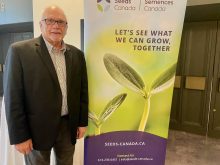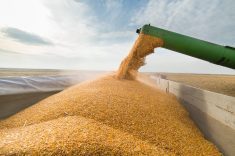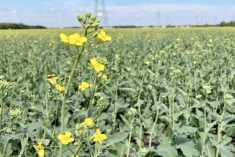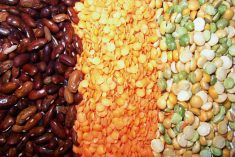A court hearing in New York City at the end of this month will determine if a "pre-emptive" lawsuit by a clutch of U.S. and Canadian organic producers against seed and ag chem firm Monsanto will go ahead.
U.S. District Judge Naomi Buchwald said she will hear oral arguments Jan. 31 in Manhattan on a motion by St. Louis, Mo.-based Monsanto to dismiss the suit filed last March 31 by a group of 83 farmers, seed growers and farm organizations.
The suit "seeks court protection for innocent family farmers who may become contaminated by Monsanto seed," according to a release last week from the Colorado-based lead plaintiff, the Organic Seed Growers and Trade Association (OSGATA).
Read Also

Senft to step down as CEO of Seeds Canada
Barry Senft, the founding CEO of the five-year-old Seeds Canada organization is stepping down as of January 2026.
The suit, the plaintiffs claim, is "to protect themselves from being accused of patent infringement should their crops ever become contaminated by Monsanto’s genetically modified seed."
"Last August we submitted our written rebuttal and it made clear that Monsanto’s motion was without merit," OSGATA president Jim Gerritsen, a seed potato grower in northern Maine, said in the release. "Our legal team, from the Public Patent Foundation, is looking forward to orally presenting our position."
Canadian plaintiffs attached to the suit include Ottawa-based Canadian Organic Growers (COG), Quebec advocacy group Union Paysanne, the Manitoba Organic Alliance, the Peace River Organic Producers Association and a number of producers in Saskatchewan, Alberta, Manitoba and Ontario.
"Monsanto’s technology is harmful for organic producers and processors," COG executive director Beth McMahon said in a separate release this week. "To penalize our growers for GMO contamination adds insult to injury, and we won’t back down from this fight."
"Never been"
Monsanto’s previous suits against farmers for alleged infringement on its patented seed suggest the company "intends to assert its transgenic seed patents against certified organic and nontransgenic seed farmers who come to possess more than ‘trace amounts’ of Monsanto’s transgenic seed, even if it is not their fault," the plaintiffs claimed last year.
Between 1997 and April 2010, the organic producers’ suit claims, Monsanto filed 144 lawsuits against farmers in at least 27 different states for alleged infringement of its transgenic seed patents and/or breach of its license to those patents.
In the list of farmers who the suit claims "did not want to be contaminated by transgenic seed" but had been sued by Monsanto, the only Canadian farmer mentioned by name is Percy Schmeiser of Bruno, Sask.
Monsanto successfully sued Schmeiser for patent violation over Roundup Ready canola in 2001, a decision upheld at the Supreme Court of Canada in 2004.
Monsanto, on its website, has said that in the Schmeiser case, Roundup Ready canola was "knowingly planted" using saved seed, not "blown in on the wind nor carried in by birds, and it didn’t spontaneously appear."
Monsanto last spring described the OSGATA-led suit as "a publicity stunt designed to confuse the facts about American agriculture."
The company has said it "has never been, nor will it be Monsanto policy to exercise its patent rights where trace amounts of our patented seed or traits are present in farmers’ fields as a result of inadvertent means."
Related stories:
More Canadians hop onto Monsanto GMO suit, June 1, 2011
Organic players join "pre-emptive" U.S. suit against Monsanto, April 5, 2011



















